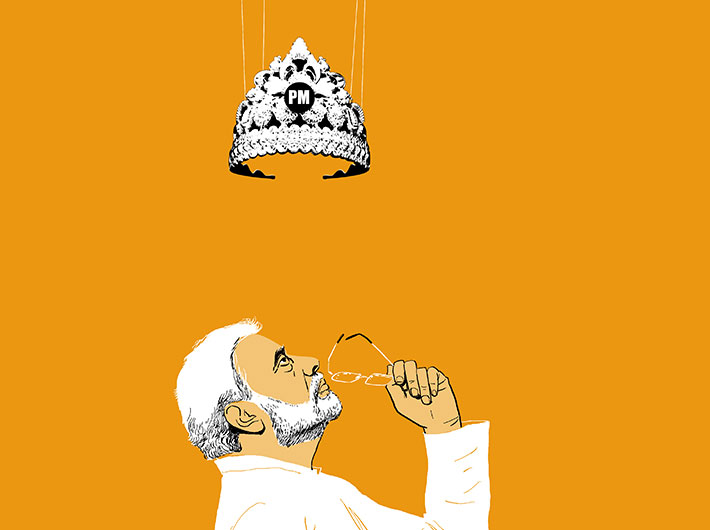There are enough straws in the wind to suggest that should Narendra Modi come to power, he would be less than content to merely tinker with the structures of governance. It will be a major overhaul
Gujarat chief minister Narendra Modi was easily one of the most maligned administrators in the world in the wake of post-Godhra riots in 2002. He was publicly ticked off by then prime minister Atal Bihari Vajpayee, who reminded Modi of the need to adhere to “raj dharma” (code of governance).
A sheepish Modi could be heard saying, “wahi to kar raha hoon (I am doing exactly that).”
In 2014, 12 year after those events, Modi’s metamorphosis into a credible, able and deft administrator across the country is certainly more than a mere image makeover by a so-called media driven by corporate interests. And his journey is certainly arduous but nevertheless quite interesting.
Those who know Modi would testify that ever since his demonisation became a political project of a certain group, he concentrated on his own strengths instead, fighting with his detractors. In his attempt to wriggle out of this precarious condition, the chief minister was advised by some close friends to build brand Gujarat and take it to the international forum. His slogans invoking Gujarati pride initially sounded revanchist rhetoric without substance but later turned out to be a carefully crafted strategy.
Every two years, he invited India’s top industrialists for a summit called “Vibrant Gujarat”. In all these meets, Modi emerged as the master of all he surveyed.
He borrowed Chinese reformist Deng Xiaoping’s maxim that he was “not bothered about colour of the cat so long as it catches the mice”. Modi unleashed the god of greed by initiating new urbanisation plans, creating new corridors for development and facilitating industry to create wealth in the state. This imagery suited well with the people of Gujarat who are culturally and traditionally oriented towards business and wealth creation.
But Modi’s endearment to India Inc was certainly not an index of his political acceptability. Gradually he built bridges with the forces inimical to those who tried to make him untouchable. At the international level, he cosied up to Japan, China, South Korea and Israel to build an axis independent of the US-European influence. For the past 10 years he has been engaging with diplomats and international experts to develop a world-view on global affairs that is not exactly in consonance with the diplomacy practised by South Block.
But all these gains did not enable Modi to shed off his untouchability at the domestic front. In the 2009 Lok Sabha elections and 2010 Bihar assembly elections, he was not allowed to campaign in Bihar on the plea that his presence would polarise the electorate. However, in 2013 and 2014, he steam-rolled his way into the Hindutva fold as cadres of the RSS-BJP projected him as their saviour. The manner in which his name was proposed as future leader of the BJP at the party’s national executive in Goa was testimony to his overweening influence. Given the kind of despondency that prevailed in the country over an effete leadership of the Congress, Modi’s muscular political idiom and vocabulary found an instant resonance.
But Modi must be grateful to his friends who initially advised him to build Gujarat as a brand to gain wider acceptability in India. In 2014, his brand Gujarat has become a mystique for people of the rest of the country to decipher. In backward states like Uttar Pradesh, Bihar and Odisha, he has conjured up a dream of prosperity for the perpetually poverty-stricken people. For people of developed regions, his muscular nationalism speaks a language that comes from a perceived position of strength.
After the first phase of polls, Modi’s centrality in this election is undeniable. Given his vast experience as administrator, he has built his worldview on everything pertaining to governance. There are enough straws in the wind to suggest that should he come to power, he would be less than content to merely tinker with the structures of governance. It will be a major overhaul.

